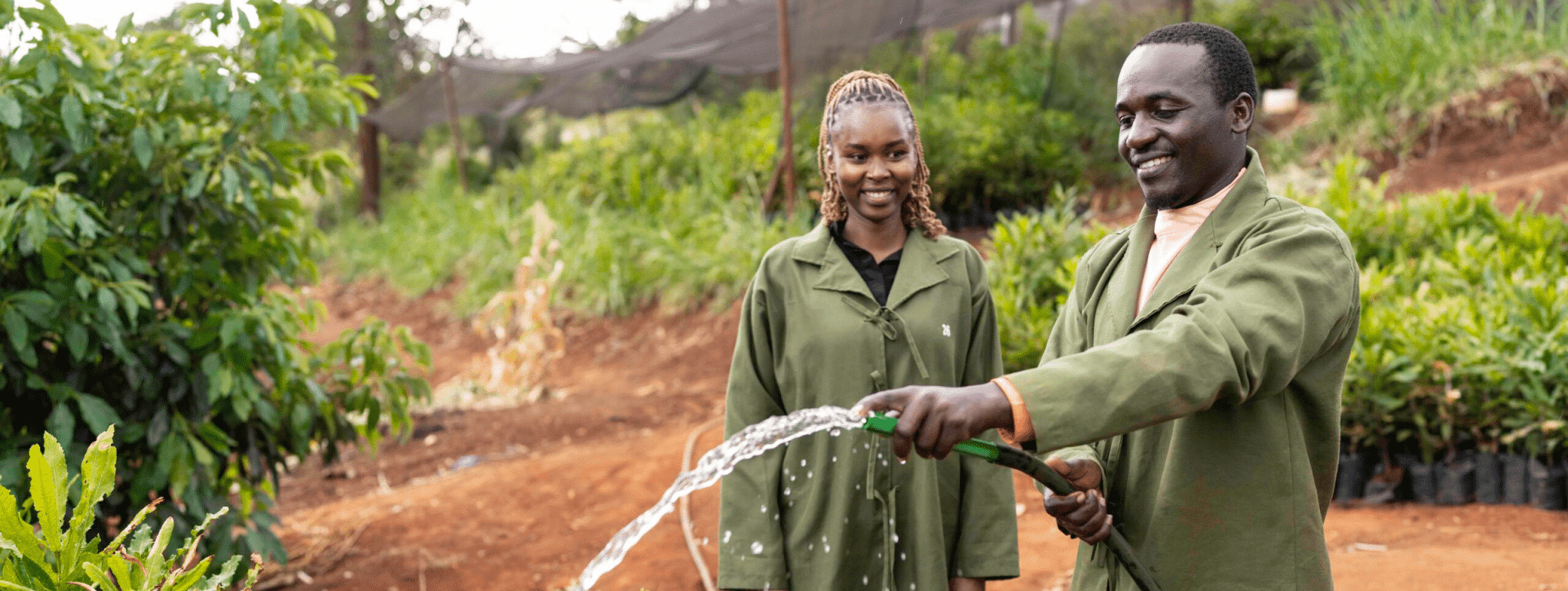
Climate Resilience Roadmap: Annual Report 2023
Empowering Agricultural Enterprises to Mitigate Climate Impact and Alleviate Rural Poverty
Smallholder farmers are highly vulnerable to climate change. Rising temperatures and changing precipitation patterns reduce crop yields, devastate incomes, and increase poverty. Climate shocks like extreme droughts and flooding can destroy farms and lives and lead to forced migration. Without action, climate change is expected to push up to 130 million people into poverty by 2030.
Small and growing agricultural businesses are a key part of the solution, providing farmers with the information and resources needed to prepare for the new climate reality. In 2020, recognizing the importance of these local climate champions, Root Capital launched the Climate Resilience Roadmap, an ambitious six-year strategy to support urgent climate action in rural communities by building the resilience of agricultural enterprises serving smallholder farmers.
Now more than halfway through our strategy, we have made significant progress against our goals, providing climate advisory services and capital to almost 250 agricultural businesses benefiting more than half a million smallholder farmers. A recent evaluation conducted by Root Capital in partnership with the impact measurement company 60 Decibels confirmed the ripple effect of our work throughout rural communities. In the evaluation, 79 percent of coffee farmers surveyed reported adopting improved, climate-resilient practices as a result of their relationship with Root Capital clients in Uganda and Rwanda. And 60 percent reported feeling more prepared for climate shocks thanks to our clients’ support.
While we’re encouraged by our progress to date, there is much work left to do to build a prosperous, resilient future for rural communities. We couldn’t do this critical work without our growing community of dedicated climate funders. Thank you for supporting us!
2023 by the Numbers
$67M in Climate Finance Disbursed To Vulnerable Communities (Annual Goal: $75M)
54% of Lending Clients Were Climate Action Leaders
123 Businesses Received Agronomic and Climate Resilience Advisory Services (Annual Goal: 69)
Grow our lending to businesses committed to climate action in rural communities
Through our ongoing lending activities, Root Capital unlocks the success, growth, and resilience of agricultural enterprises on the front lines of climate change. These enterprises provide invaluable support to farmers, including resources and training to invest in regenerative agriculture, natural climate solutions, renewable energy, and ecosystem preservation. As part of our Climate Resilience Roadmap, we seek to increase our lending to “climate action leaders”—businesses that are already making substantial contributions to combatting the climate crisis by, for example, supporting reforestation or agroforestry farming practices that remove carbon from the atmosphere. Since the start of the Roadmap, we’ve grown our portfolio of climate action leaders by more than 80 percent, from 63 businesses in 2019 to 115 in 2023. Climate action leaders now represent 54 percent of our global lending portfolio. In 2023 alone, we disbursed $65 million to help climate action leaders sustain and scale investments in climate-friendly initiatives. Disbursements to climate action leaders decreased compared to 2022 due to global market challenges, especially coffee price volatility and depressed demand for clients’ products, affecting our global lending portfolio.
Cultivate business and farmer capacity to mitigate and adapt to climate change
Climate change is an ever-evolving threat. To prepare, businesses need up-to-date, localized information on climate risks and solutions. Through our Agronomic and Climate Resilience Advisory (ACRA) services, Root Capital helps agricultural businesses face climate change by providing data on local climate risks and adaptation measures, co-designing climate adaptation plans, and building businesses’ capacity to deliver climate-smart training to farmers.
Innovate financial solutions to unlock business investments in climate action
Smallholder farmers are among the most threatened by climate change, yet they receive less than 1 percent of global climate finance. In particular, smallholder farmers face an acute financing gap for investments to prepare for climate shocks and adapt to future shifts in climatic conditions. In 2023, Root Capital expanded our efforts to design and test innovative climate solutions to help our clients make new investments in climate action. Based upon our clients’ needs, we focused on three climate finance priorities:
- resilient farm management, especially support for agroforestry and regenerative soil management practices;
- climate-smart business infrastructure; and
- business nurseries for climate-resilient crops and shade trees.
In 2023, we tripled our climate action loan disbursements compared to the previous year, disbursing nearly $1.6 million in financing to nine businesses in Central America and East Africa for business investments in soil regeneration and renewable energy. These high-impact loans enable our clients to invest in a climate-resilient future for their farmers, employees, and broader communities.
We are scaling our climate lending by making climate loans more affordable and accessible for clients. In general, climate action loans carry a higher degree of risk (due to greater exposure to production risks and climate shocks) and offer lower financial returns (due to smaller loan sizes) than Root’s Capital’s typical loans. Rather than pass these higher costs on to borrowers, we share the costs with climate funders. By collectively absorbing the higher costs, Root Capital and our funding partners are working to close the climate finance gap for small-scale agriculture without increasing risk for vulnerable rural communities.
Since not all climate investments are suited to debt financing, we also deploy grants to help clients fund smaller climate investments or test new innovations. In 2023, we disbursed $300,000 in climate resilience grants to 17 clients. Clients used resilience grants to construct solar dryers, start or expand tree nurseries, and pilot biodigesters to turn waste into clean energy and fertilizer (see WHAT’S NEXT FOR CLIMATE ACTION? below for details).
Since 2020, we have disbursed over $3.2 million in innovative climate financing to agricultural enterprises.
IMPACT STORY: COCAOL
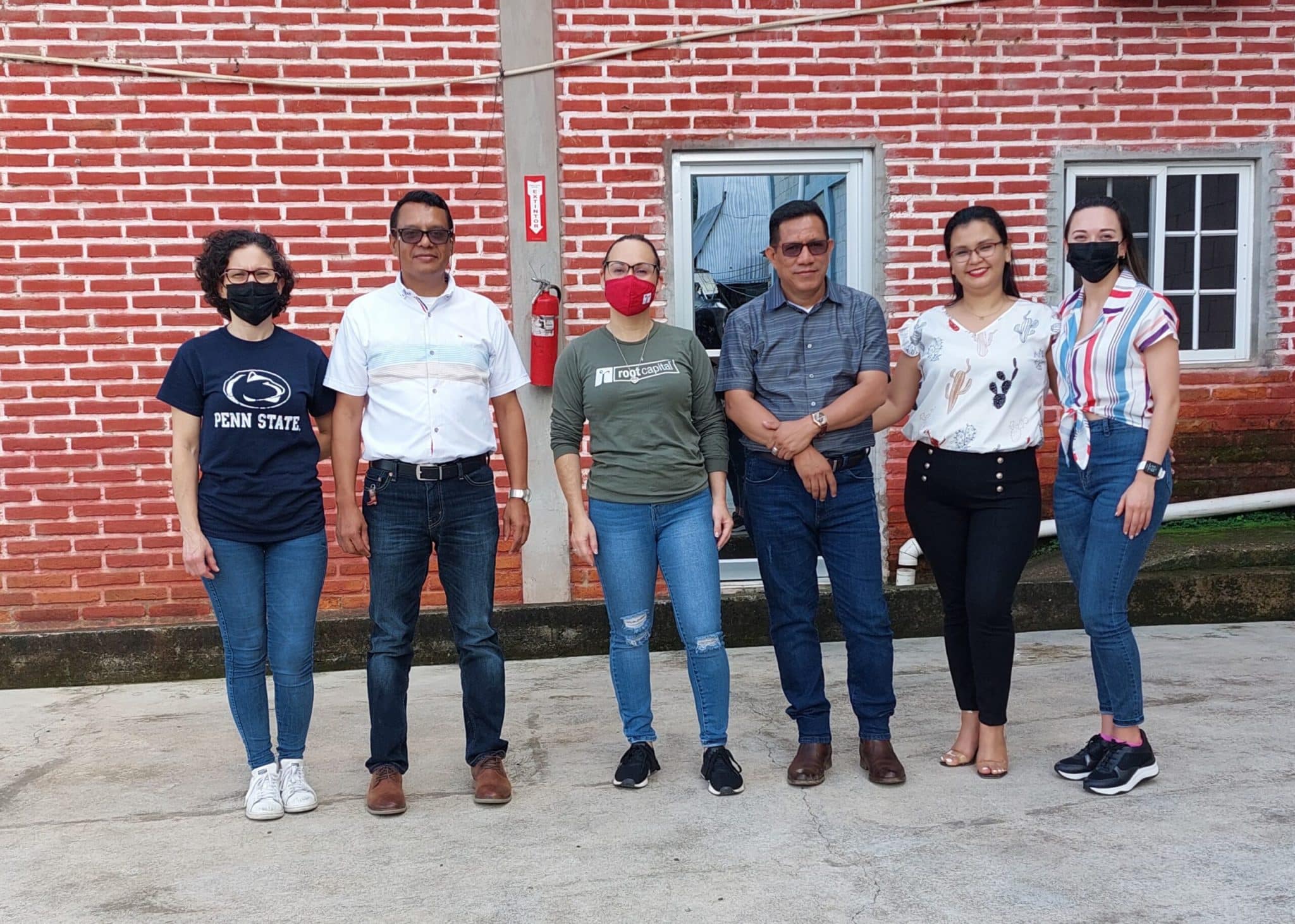
Employees at Cocaol, a Honduran coffee cooperative and Root Capital client since 2008, alongside Root Capital Senior Loan Officer Sharon Serrano and Root Capital Junior Loan Officer Roxan Piedra. Photo credit: Root Capital.
Olancho, Santa María del Real, Honduras
The Olancho Limited Coffee Cooperative (known as Cocaol) is one of the oldest and largest associations of specialty coffee producers in the Olancho region of Honduras. Cocaol connects farmers to high-value certified markets, provides training and loans to members, and supports reforestation efforts in the broader community. The cooperative’s farmers grow organic, agroforestry coffee, meaning they intentionally integrate coffee crops with trees and shrubs. Agroforestry is a leading natural climate solution that contributes to carbon drawdown, better soil health and biodiversity, increased farmer income, and resilience to climate shocks.
Root Capital’s ACRA team strives to meet clients, like Cocaol, where they are in their respective climate adaptation journeys. The cooperative had analyzed soil health on members’ farms, but sought assistance interpreting the results and translating them into guidance for farmers. We worked with Cocaol’s leaders to convert the soil analysis results into a regenerative fertilization plan to improve members’ soil health and ultimately their coffee yields. In 2023, we disbursed our first soil regeneration loan to Cocaol for $150,000. This loan enabled the cooperative to get more fertilizers to coffee farmers during a crunch period when farmers needed to invest in fertilizers and labor to secure a good crop, but had limited cash on hand from the last harvest.
With holistic support from Root Capital, this climate-forward cooperative continues to scale their regenerative soil management practices to benefit farmers and the planet.
WHAT’S NEXT FOR CLIMATE ACTION?: TRENDS AND NEW OPPORTUNITIES
Just as climate change evolves, so do our global solutions. 2023 brought a number of shifts in global efforts to combat climate change. Several climate solutions have major implications for our clients and their farmers, starting with the introduction of game-changing anti-deforestation regulations. Below, we discuss some key climate trends we’re tracking and how we’re working to help clients seize new opportunities.
The European Union’s Regulation on Deforestation-Free Products (EUDR)
Starting December 30, 2024, the European Union (EU) will no longer allow coffee, cocoa, and other products linked to deforestation and forest degradation within the EU market. This regulatory seachange (referred to as the EU Deforestation Regulations, or EUDR) presents a challenge to our coffee and cocoa clients and their smallholder farmers, as many lack the specific data to demonstrate compliance. If they cannot demonstrate compliance in time, our clients and farmers risk losing access to the important EU market.
Around the world, Root Capital coffee and cocoa clients are investing to show that their farmers are deforestation free, and Root Capital is working to help clients prepare for this new regulatory reality. In 2024, we will pilot an EUDR-focused advisory service to help clients understand the regulations; collect geospatial data as needed, leveraging our Digital Business Intelligence Advisory; and identify and respond to compliance risks. While we applaud the spirit of the regulations, we also see that the significant, unexpected costs of demonstrating EUDR compliance are diverting limited resources from other important climate solutions, especially related to adaptation. This is especially troubling as agroforestry farmers already make important contributions to climate change mitigation and face increasingly frequent and severe climate shocks.
Carbon Markets
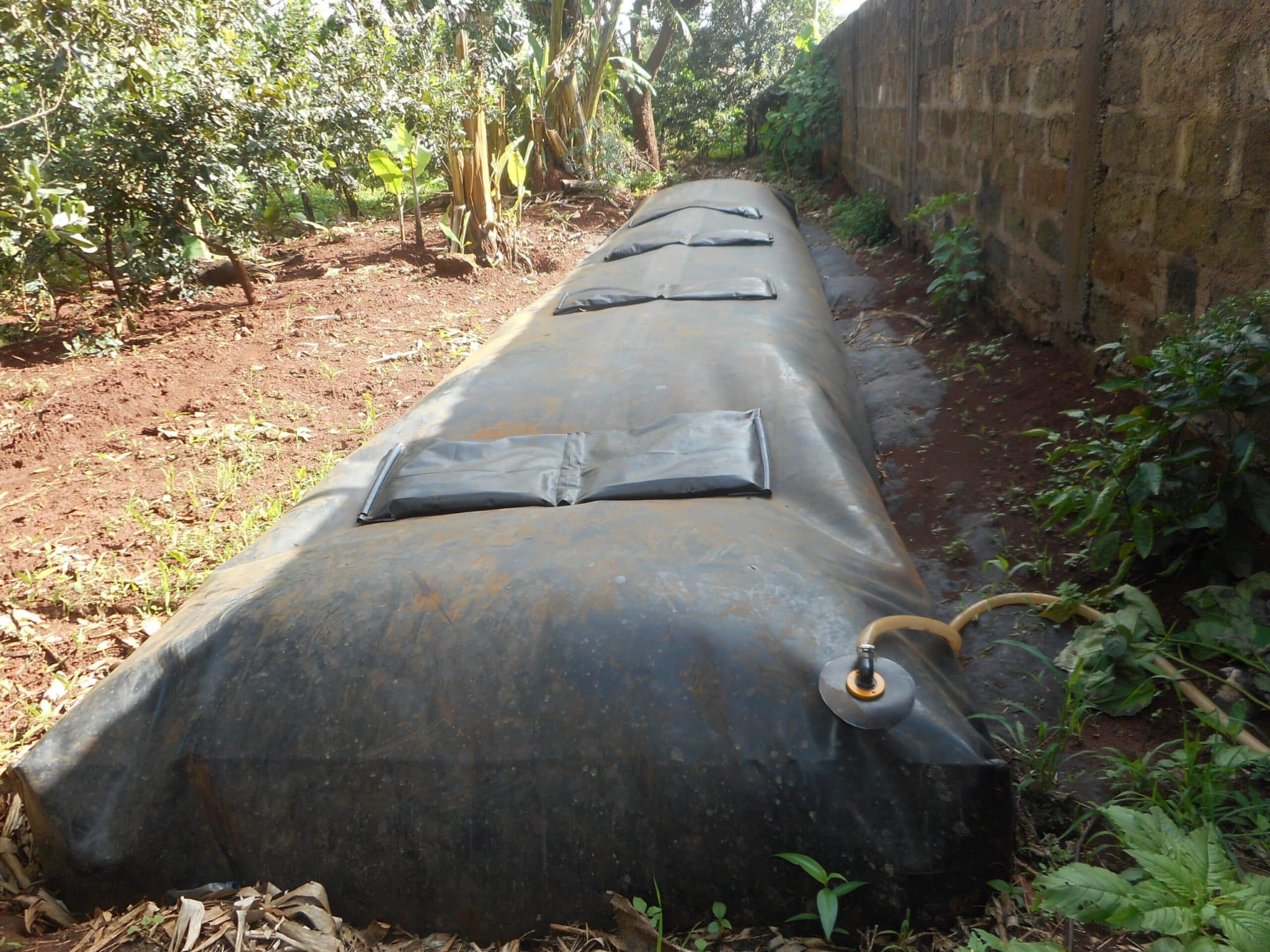
Employees at Cocaol, a Honduran coffee cooperative and Root Capital client since 2008, alongside Root Capital Senior Loan Officer Sharon Serrano and Root Capital Junior Loan Officer Roxan Piedra.
Carbon markets seek to combat climate change by paying for the reduction of carbon and other greenhouse gas emissions. These markets could bring significant climate finance to smallholder communities, especially given growing recognition of nature’s important role in mitigating climate change. Yet smallholder farmers generally do not have access to carbon markets. Over the last several years, Root Capital has been working with partners to increase carbon market access for smallholder farmers and businesses.
One such partner is Sistema.bio, a leading manufacturer and distributor of biodigesters, which convert farm waste into organic fertilizer and renewable energy for farmer households. Biodigesters capture methane from fresh manure and organic farm waste before it can be released into the atmosphere. They lower farmers’ greenhouse gas emissions and can generate carbon offsets, primarily due to improved manure management and reduced deforestation. In 2023, we partnered with Sistema.bio and two macadamia businesses to provide farmers with access to biodigesters, financed in part by carbon credits. To make the biodigesters more affordable for farmers, Root Capital provided each business with a grant to establish a revolving loan fund for farmers. Farmers could receive the biodigesters on credit and pay back the business over multiple harvest cycles. Given positive feedback from participating farmers to date, we are looking to expand the program with Sistema.bio this year.
Amplify learning to encourage adoption and replication by others
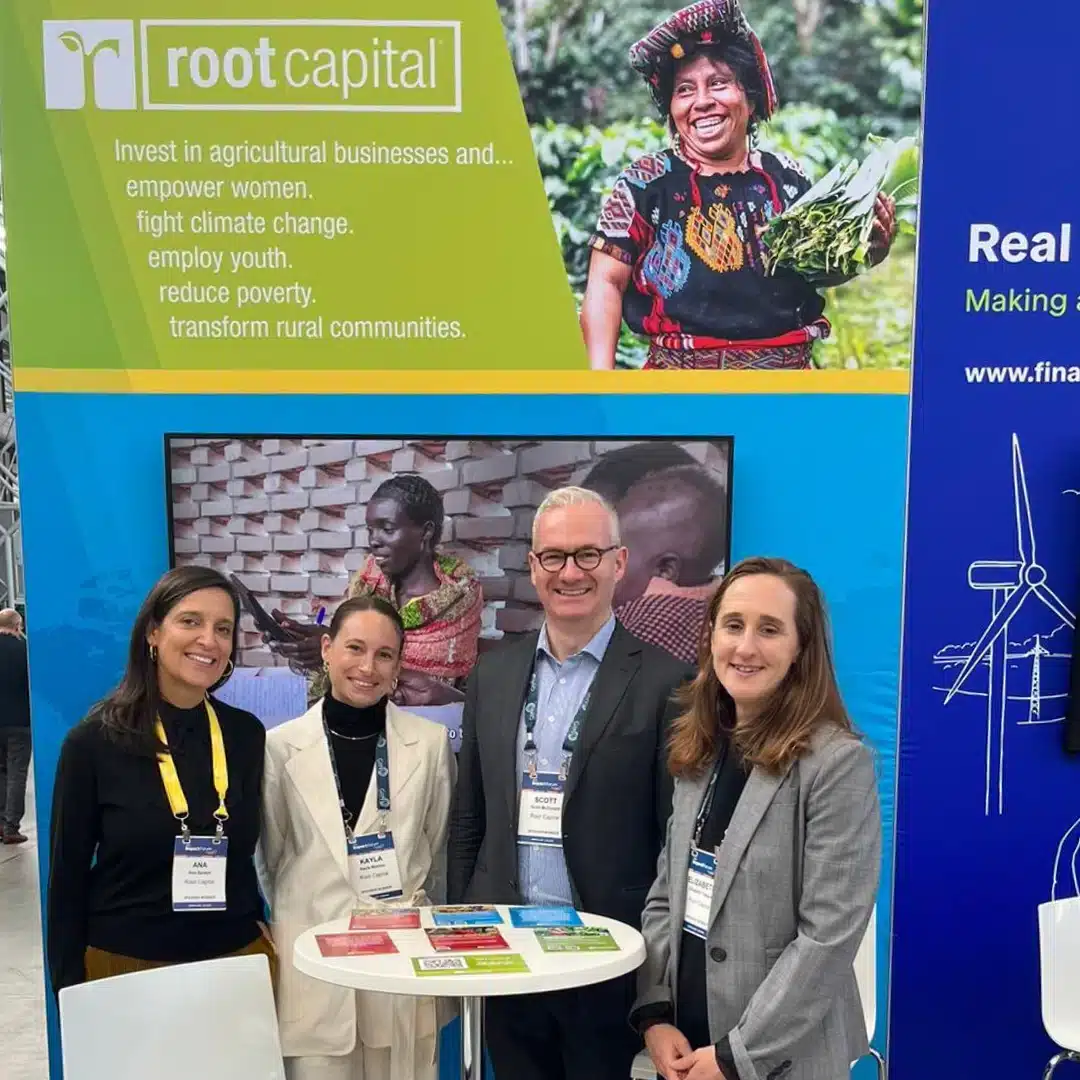
The Root Capital contingent at the GIIN Impact Forum in Copenhagen in October 2023. Photo credit: Root Capital.
As an impact investor working at the intersection of smallholder farmer livelihoods and climate action, we are increasingly alarmed by the widening climate adaptation finance gap. To encourage other stakeholders to invest in climate action for rural communities, Root Capital continued to share our experience from 24 years of partnering with agricultural businesses to support smallholder farmers.
We have amplified our learning on the challenges and opportunities of climate finance for agriculture via multiple publications, expert working groups, and conferences.
Of note, we co-published a learning report on the potential of organic agroforestry coffee as a natural climate solution, summarizing our experience piloting the Cool Farm Tool with multiple client and coffee industry partners. We also hosted a panel on climate finance for smallholder farmer communities at the Global Impact Investing Network (GIIN) Impact Forum in Copenhagen. We were also featured in several expert interviews and op-eds. In all these instances, we have continued to share what we’re hearing directly from agricultural enterprises and farmers on the front lines of climate change.
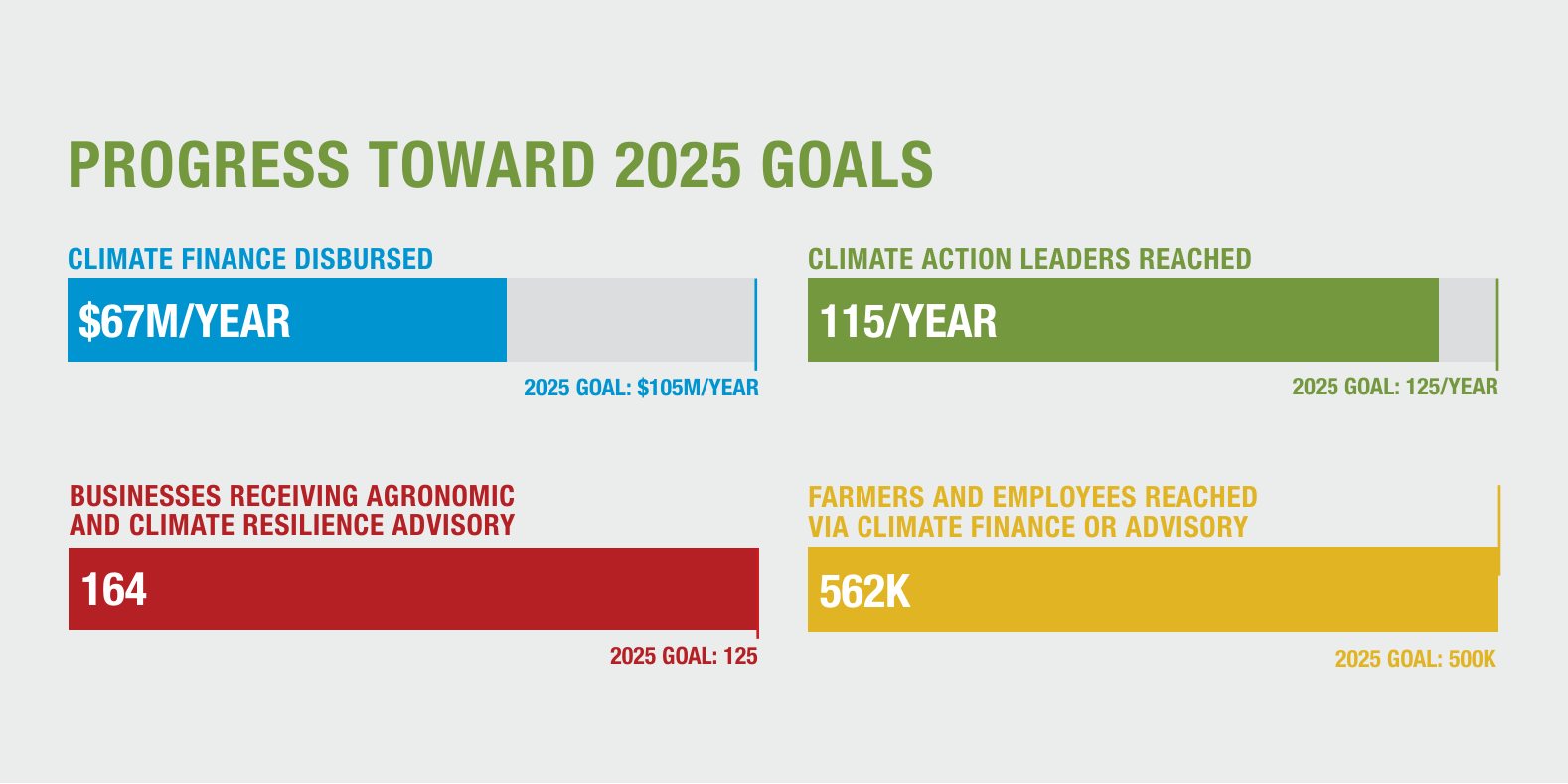
Thank you to our growing community of dedicated climate funders for making this work possible. With special thanks to:
- Gordon & Llura Gund Foundation
- Grant & Lara Gund Foundation
- IKEA Foundation
- Keurig Dr Pepper
- Swiss Re Foundation
- The EcoMicro program of the Inter-American Development Bank
- Trafigura Foundation
- Vitol Foundation
- Waverley Street Foundation
- United States Agency for International Development
Thank you to our growing community of dedicated climate funders for making this work possible. With special thanks to:
- Gordon & Llura Gund Foundation
- Grant & Lara Gund Foundation
- IKEA Foundation
- Keurig Dr Pepper
- Swiss Re Foundation
- The EcoMicro program of the Inter-American Development Bank
- Trafigura Foundation
- Vitol Foundation
- Waverley Street Foundation
- United States Agency for International Development
Click HERE to download a pdf copy of this report.
